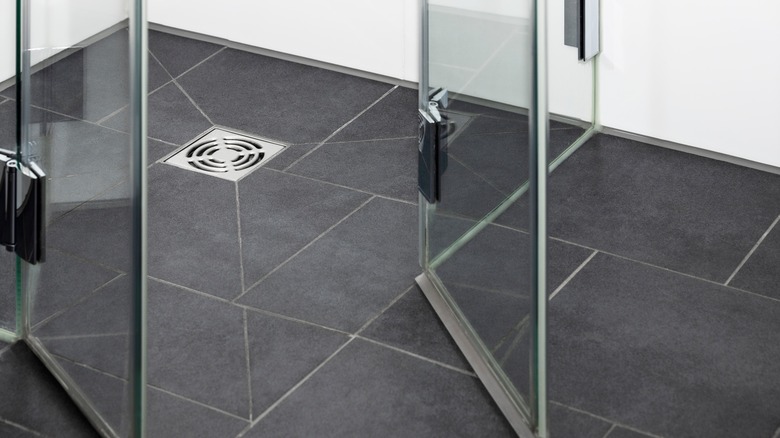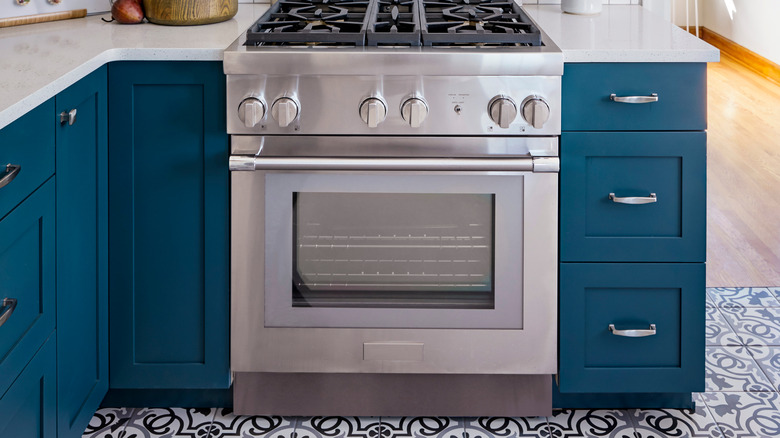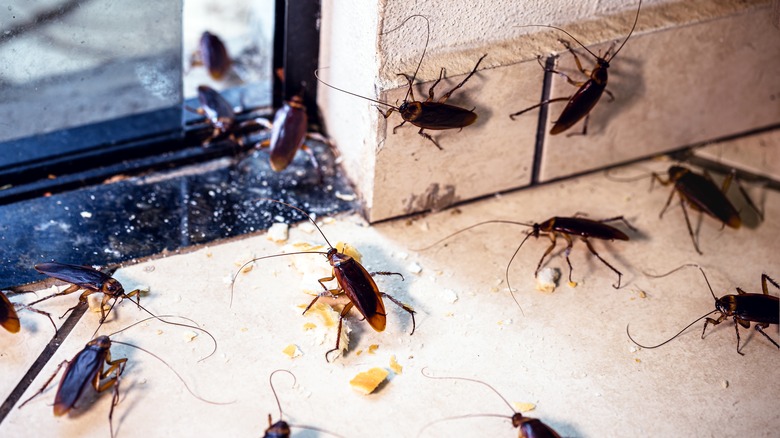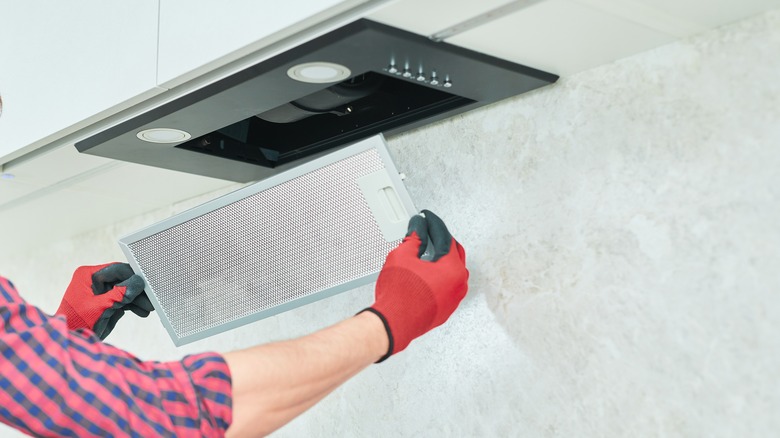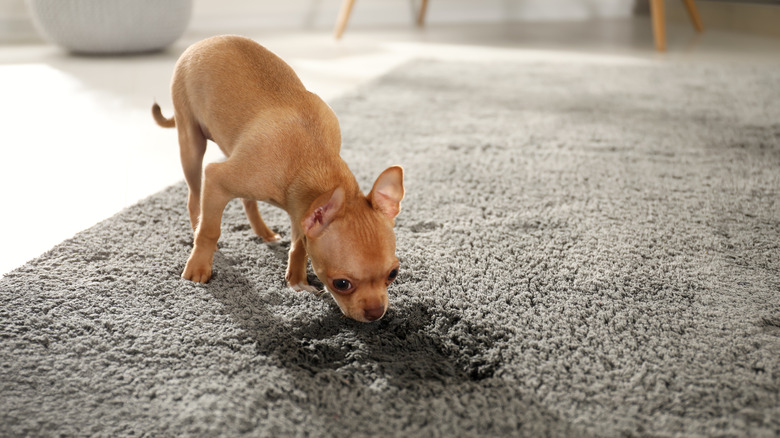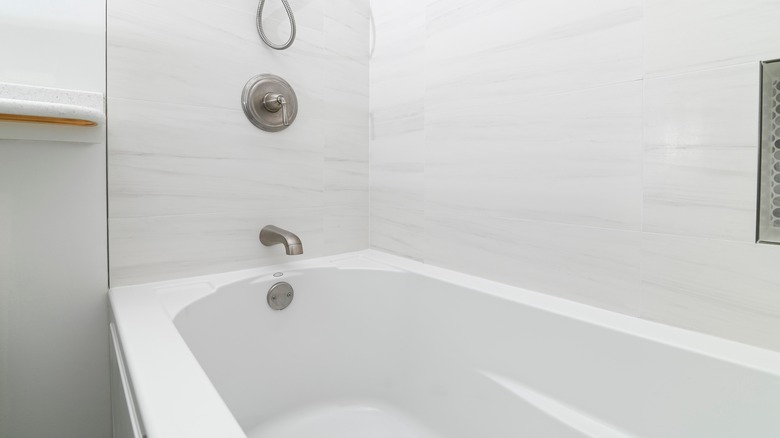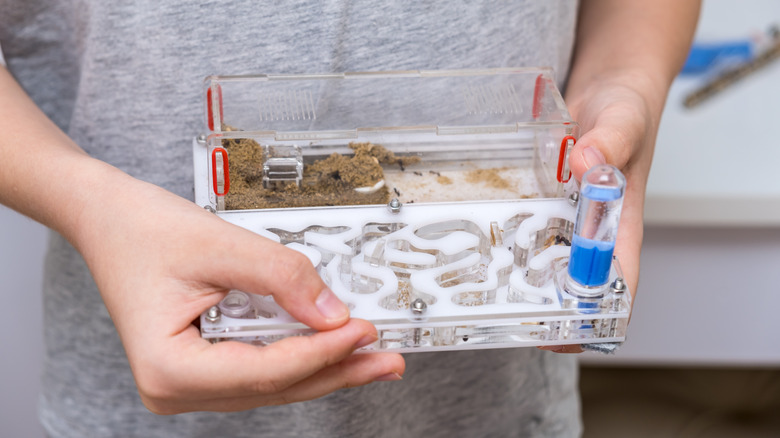Professional House Cleaners Reveal The Grossest Things They've Encountered In Homes
We may receive a commission on purchases made from links.
A clean house with sparkling surfaces is the dream. However, most people nowadays are too busy to give their homes a thorough scrubbing once a week. This is where professional cleaners come in. They ensure your home is ready for an "Architectural Digest" feature (or discerning surprise guests!) at a moment's notice. Plus, with an average session costing between $118 and $236, it makes sense to let the pros take the reins. However, sometimes this 'convenience' narrative does a 180 on the flip side. While most professional cleaners are prepared to handle anything from regular tidying to a deep cleaning session, a few jobs stand out — and not in a good way.
Simply put, an abundance of dirt, dust, and cobwebs is parred for the course, but the plot thickens when a cleaner finds themselves face-to-face with undisclosed bug infestations (yikes!), battling strong pet accidents, or finding forgotten takeout in the very back of a cabinet. It's enough to turn an easy cleaning job into a nightmarish one. Want a little peek behind the scenes to know what makes a pro grimace? We interviewed seven professional house cleaners to get an exclusive peek into the grossest things they've encountered. So, mentally prepare yourself as we delve into situations that made these pros' noses wrinkle — and tips on how to avoid them!
Neglecting your bathroom's drainage will create a drain hair monster
When showering, you see your hair going down the drain now and then, but usually don't give it a second thought. Well, if you don't take the time to routinely clean out your drain, your housekeeper might come face to face with something dubbed the "bathroom drain hair monster. When reminiscing about one of the grossest things he's encountered while cleaning, Jon Cronin, founder and owner of Glimmer Cleaning Co., told House Digest, "When unclogging a neglected drain, you pull out a massive, slimy hairball mixed with soap scum and other debris to find the hair monster."
To steer clear of the hair monster in your bathroom, pull on a pair of cleaning gloves and pull out the accumulated hair and other debris from the drain every month. If you shed a lot of hair or multiple people use the same shower, increase that frequency to twice a week. However, if it's been a while between cleanings, you'll need to give it a more thorough scrubbing. Using a screwdriver or by applying a little pressure, pop off the cover and remove the hair clumps covered in soap scum. Keep a small brush (or tweezers) handy to force the stubborn debris out. Once done, clean your shower drain with a common household essential like hydrogen peroxide and add a haircatcher to halt a bathroom drain monster's progress.
Cluttered kitchen cabinets are the perpetrators of 'ancient leftover takeout'
Ordering dinner (or lunch) to satiate your cravings is a common luxury. But what do you do with the leftovers? You either dump or save it for later. The only problem with choosing the latter option is forgetting about the food after dumping it in a cluttered cabinet. Having encountered the formidable "ancient leftover takeout" a couple of times, Cronin expands, "In the back of a kitchen cabinet or on top of a high shelf, you discover an old takeout container filled with a now unidentifiable, rotten mess. This can happen in kitchens where items are frequently moved and reorganized, leading to forgotten leftovers."
The easiest way to avoid forgetting about leftovers is to follow a few simple tips on how to declutter your kitchen without going overboard. Clear out your fridge contents once a week before you go grocery shopping to stay on top of expiring food. Then, for a more thorough sweep, clear out the cabinets, shelves, and drawers every few months, taking stock of what can stay and what needs to be tossed. In case you constantly move items about, assign each storage space a particular zone and stick to it. For instance, only store occasionally used items, like your baking ingredients, on the top shelves. As for refrigerated food, the USDA recommends refrigerating or freezing it as soon as possible, and adhering to the 2-hour rule. According to the rule, meat-, egg-, and poultry-related dishes and casseroles should be thrown out if they're left out at room temperature for over two hours — one if the mercury hovers near 90 degrees Fahrenheit — since they become unfit for consumption.
The area under your stove can harbor food crumbs, dead insects, and dust
If you enjoy cooking, chances are you clean the stove on a daily basis to prevent the grease splatters and accidental spills from creating a grimy work zone. However, there's one part of an oven that everyone forgets to clean, and that's the area under the stove. Considering it as one of the grossest things she's confronted, Kathy Cohoon, operations manager at Two Maids, told House Digest in an exclusive interview, "I have found dead insects and roaches under there, old moldy food, you name it. The extent of each varies, but the space under the stove is a vortex and it catches grease, crumbs, dust, and other debris over time. People forget to clean in that space because they cannot see it on a day-to-day basis, which can lead to a nasty buildup."
Besides being gross, it might also negatively influence your oven's functioning, so make it a habit to clean the out-of-sight, out-of-mind zone every quarter or so. The easiest way is to use the flat attachment on your vacuum cleaner (or a microfiber cloth fixed to the end of a mop) to clean the space. For a thorough cleaning, carefully shimmy your stove away from the wall, turn off the gas supply, and shut off the gas lines before mopping and vacuuming the area. Alternatively, use the cleaning hack that lets you clean under the stove without the heavy lifting: Remove the warmer drawer (if possible) and scrub the space clean.
Undisclosed insect, bug, or mold infestations are a house cleaner's nightmare
Walking in on a swarm of insects or bugs is the stuff nightmares are made of. Add a malodorous environment and moisture-loving mold to the mix, and it's a house cleaner's worst horrors come to life. Recounting her grossest experience, Carly Castro, Owner of FreshLee Cleaning Co., mentions in a House Digest exclusive, "The worst has got to be when I was asked to come in immediately to deep clean one bathroom and one bedroom in a home. As soon as I walked in, there was an awful stench that stopped me dead in my tracks. It was a SEVERE cockroach infestation." There were roaches and roach droppings in every corner of the house. She wanted to leave the job immediately, but he business was just starting to take off at the time and didn't want to get a bad review for leaving a client high and dry. So she cried in the bathroom for 10 minutes and put her gloves on. But that wasn't the end of it. "There was also a horrible black mold infestation all over the bathroom ceiling. At the end of the day, what should've been a quick 3 hour cleaning turned to 6 hours and I had to throw away most of my supplies and my purse!" explains Castro. Unfortunately, this wasn't a one-off situation, with people willfully omitting details about an infestation.
Since a pest infestation may be a bigger problem than you think, take steps to eliminate them from your home. Put on your detective hat to identify the critter you're dealing with and use the right kind of repellents or baits. You must also disinfect any items the pests might have come into contact with to minimize the spread of disease-causing germs. Alternatively, contact a professional exterminator and let them deal with the problem. Eliminate potential food sources, seal off gaps in entryways and windows, and minimize clutter to discourage their return.
Your kitchen's range hood isn't safe from pests
Your range hood's primary purpose is to remove the cooking smoke from your kitchen, effectively maintaining the room's IAQ (indoor air quality) and eliminating foul odors. However, soaking up the grease, smoke, and dust with gusto regularly will lead to clogs and fire hazards. Moreover, the promise of food and shelter might also serve as a dinner bell for crafty critters. Recalling one of his grossest jobs, Peter Hansen, co-owner and managing member for Sparrow Estate Management, tells House Digest, "A family of mice somehow got stuck in a kitchen exhaust filter and didn't make it out. Over time, they became covered in layers of cooking grease, almost like they were frozen in time."
Although he encountered the dead carcasses in the range hood just once, "it's a reminder of how easy it is to overlook those hidden, out-of-the-way spots in our homes where unexpected things can happen," he said. You can keep pests away from your range hood by scheduling a deep cleaning session every month or quarter. Cover the stovetop, shut off the appliance's power supply, don your rubber gloves, and pull out the filters and grates. Now, grab your trusty Swiffer or microfiber cloth to begin dusting the hood's exterior. Combine vinegar and water cleaning solution in a 1:1 ratio to get rid of stubborn stains. Check the vent for dead (or live) critters nesting inside and give it a clean. Finally, replace the charcoal filter or treat the mesh one to a soapy water (warm water is best) concoction.
An unclean fridge serves as a 'come one, come all' buffet for flies and bacteria
When was the last time you cleaned your fridge of expired products and spoiled food items? If you don't know the answer to the first question, then Axel Avery, a cleaning expert at Oakville Maids, has a cautionary tale for you. He revealed the gross refrigerator he encountered on a job: "I was deep cleaning a fridge once and I found fruit flies [literally]. And that was because they left a box with sliced cheese that looked like everything but cheese. It was a mix of green, black, gray, and furry." The shelves and drawers weren't much better off. "They had stuck, dried meat juice," he said.
To prevent your fridge from becoming an all-come, all-serve buffet for flies and bacteria, give a cursory clean every week (or two if the appliance isn't stuffed to the gills) and schedule a deep clean every quarter. Start cleaning the device by switching off the power button and unplugging it prior to emptying the drawers, shelves, and side pockets. Carefully check each item's life expectancy and toss out anything past its prime. Once done, try this easy vinegar hack for a squeaky clean fridge and place the food items back inside. In case it's not possible to remember each item's best-by date, stick labels on top of the containers and position the ones nearing their death sentence at eye-level.
Stinky carpets can be tough to stomach
You most likely see your pets as family. As a result, you might choose to ignore some of their shenanigans and adjust your expectations. However, avoid going overboard, or your home might soon smell like a zoo. Case in point, Avery mentions, "The second [grossest] one was having to vacuum a carpet that stunk like cat pee. It was not easy!" Besides being assaulted by the pungent smell of ammonia, "it was just awkward/funny to realize that the owners had no idea how awful it smelled. People get used to their pet's smell, but if you're a guest, you quickly realize the stench is attacking your nostrils."
Keep your olfactory senses intact by training your pets well and discourage them from conducting their business wherever convenient. However, despite your best attempts, accidents happen. If you notice the wet spot right away, lay down paper towels and top them with a chunky layer of newspapers to soak up the liquid. You can even place a few newspapers under the carpet. Put your weight on the papers to ensure they soak up every drop, and repeat as required. The final step is to blot the area with fresh water and towels. If the urine has stained, soak the liquid and spray a mixture of equal parts white vinegar and water on the spot. Give it a few minutes before blotting the area. Repeat as needed. Finish off by covering the area with baking soda and letting it stay overnight prior to vacuuming it.
Cleaning soggy hair clumps from a bathtub's drain is no one's idea of a good time
Soaking in your bathtub after a draining day is the epitome of relaxation. But if the clumps of hair and thick layers of soap scum are ever-present, they can cut your enjoyment short. In fact, a blocked bathtub drain might even make it difficult for you to grab a shower without standing in a pool of your own filth, provided they're a single unit. Feeling icky yet? Tony Tran, Founder of Frigg Services, had a similar experience once. He recounts, "One of my most memorable cleaning jobs was tackling a bathroom that needed some extra attention, but it was really when I saw the bathtub. It was filled about a quarter way up with hair and water. The drain was clogged with wet and soggy hair. It took a lot of mental strength to get the job done."
To avoid giving your house cleaners mental trauma, gather all the debris that gets stuck in the drain once you pull the stopper post every bath. In case the drain is looking pretty ripe, pull on your thick cleaning gloves and pull away the stopper or strainer. Then, pull out as much buildup as possible with your hand. Lastly, use a drain snake to pluck out the hidden residue. We like Forlivese's 3-pack, 25-inch drain clog remover, retailing on Amazon for $13. Once clean, pour some boiling water down the drain to clear the channel.
Pets hiding their 'treasures' in unexpected spots is a recipe for disaster
Whether you have dogs or cats, sometimes they bring their prey home as trophies. If they don't lay them at your feet to show off, chances are they'll hide them somewhere in the house. The decaying animal wouldn't just invite worms, flies, beetles, and their extended brethren to your doorstep — it'll also stink up your home. Andriy Neborak, founder and CEO of Luxury Cleaning NY, told House Digest, "A memorable incident involved an enthusiastic pet owner. We pulled up to a nice apartment and expected the usual dust bunnies, pet hairs and food crumbs. However, we were overcome by a strange scent before we even stepped in the door. Seems that Fido – the pug – had developed a proclivity for finding new hiding places for his 'treasures;' a favorite was the air vents. The result was an olfactory odyssey of eye-watering and gag-inducing stenches from every direction." As you can imagine, they had to work hard to remove the odors. "That day, our air purifiers became our best friends. After placing one in every outlet and opening every window we could find, we donned our heavy-duty gloves and disinfectant wipes, and launched our mission of olfactory annihilation. It was a long battle, but in the end we prevailed and left a fresher smelling environment."
If your pets have been exhibiting a similar behavior, keep an eye on them at all times and bell your cat and dog (provided they're not anxious) to keep their prey safe. In case they present you with their kills, strongly discourage them. Playing games that keep them active and their predatory instincts engaged might also help. However, if you notice bad smells emanating from not-so-obvious locations, like the walls and yards, open the windows, engage your air purifier, and inspect the site to determine if you have a dead animal on your hands. If the answer is in the affirmative, grab your gloves, garbage bag, and cleaning products to remove the body and sanitize the area afterward. Squeamish pet owners might want to contact experts.
Forgotten presents can create big problems
Sometimes birthday or holiday presents don't hit the mark, and you rush to the store to return them. However, if you forget about the gifts altogether, Neborak has another gross encounter in store for you. "Another time, we were cleaning a bachelor's pad, expecting the usual beer bottles, chip crumbs, and standard 'manly disarray'. Imagine our surprise when we discovered a beautifully crafted ant farm next to the pizza boxes. A bustling metropolis of ants wasn't on the list of normal expectations for cleaning contracts. After a quick call to the slightly bewildered unit owner (it seems it was a housewarming gift), we removed the industrious insects and relocated them outdoors and carried on with the cleaning."
To make your house cleaner's job easier, take stock of the gifts you receive, especially if they're the live kind. You don't want to accidentally sic an escaped python on your cleaners or live with a dead Nemo on your conscience. Feed the insects per the instruction manual and provide them with a clean habitat. Additionally, monitor their health and take them to the vet when required. In case you aren't equipped to care for another living being, be considerate and re-gift them to someone who might appreciate them.

